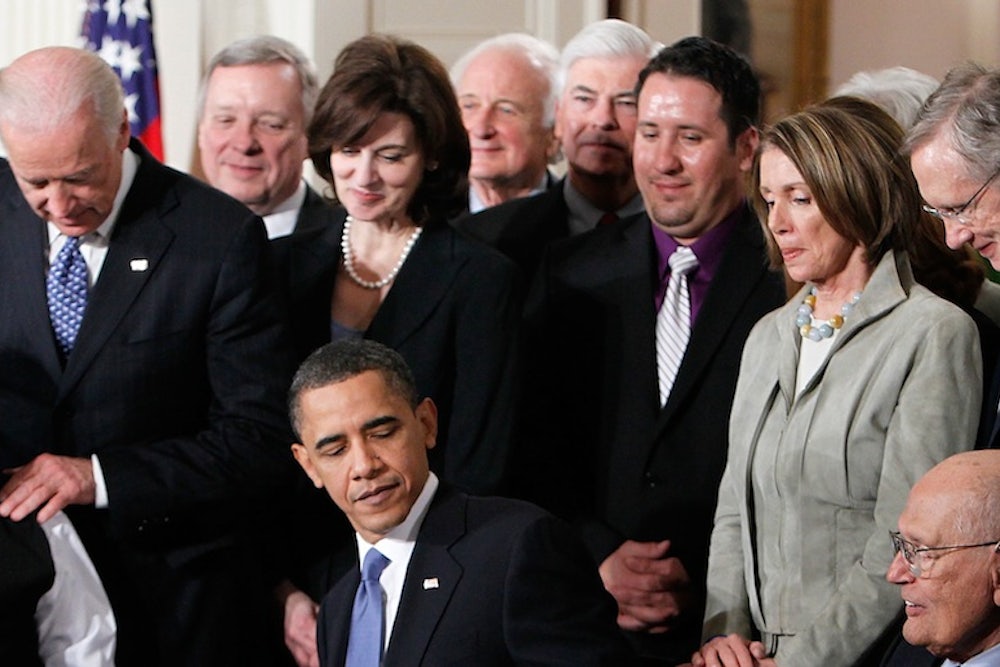Remember all that controversy last week—because somebody discovered some old statements, from MIT economist Jonathan Gruber, echoing the theory behind those new Obamacare lawsuits? Now somebody has found yet another old quote, making the same point, only this one didn’t come from Jon Gruber. It came from ... me.
It happened on January 12, 2010, during a broadcast of “Fresh Air" with Terry Gross on National Public Radio. At the time, House and Senate leaders were meeting with the White House, in order to forge a compromise bill based on the measures each chamber had already passed. This was before Scott Brown won the special election for Ted Kennedy's old Senate seat, depriving Democrats of their filibuster-proof majority and forcing them to pass the Senate bill with only modest, subsequent amendments. One major sticking point was the design of the new insurance exchanges. The House bill envisioned a national exchange. The Senate bill favored state exchanges.
Gross asked me about that issue—and what might happen if, under the Senate version, state officials decided not to do their own exchanges. "I'll be honest," I responded. "This is not something I've looked into that closely because I don't think it's going to end up in the bill." I should have stopped right there. Instead, I proceeded to speculate about a mechanism similar to the one that Michael Cannon, Jonathan Adler, and the law’s critics have suggested the Senate was trying to create. My description is a bit muddled and it went on for some time, but I made the point that "I can't possibly imagine a state opting out of an insurance exchange, given it's a good deal for the state."
I learned about the quotes late Wednesday, when I read a longer (and well-reported) story on the whole controversy by Dylan Scott of TPM. You can read his story here and the full transcript of that “Fresh Air” appearance here. I wish I could tell you definitively what I was thinking at the time but, more than four years later, I truly don't know.
My best guess? I certainly knew the House and Senate bills contemplated different exchange models—and that liberals preferred the House version, mainly because they were skeptical that state officials could or would adequately police insurers. But I hadn't investigated further, as I said on the air, most likely because I was busy writing on other topics getting more attention. Once the issue came up in the House-Senate negotiations, I probably started asking more questions, became satisfied that the exchange proposals were actually similar, and moved on to other things. Note that the "Fresh Air" interview took place just three days before the e-mail exchange I wrote about earlier this week—a communication with Debbie Curtis, a key House aide who was part of those negotiations, who told me that the differences between the House and Senate versions of the exchanges were mostly a "red herring."
Again, I can't be sure about all of this and readers will need to make up their own minds. I'd be lying if I said that seeing and hearing my own words didn't give me pause. Still, I didn't write the law. I wrote about the law. The real-time information I had in early 2010, while negotiations were taking place behind closed doors, was necessarily incomplete and tentative—a point I tried to get across even then. That’s one reason journalists like me relied so heavily on other sources while reporting this story, as we always do when writing about complex legislation. We don’t have the time or specialized knowledge to have all the answers, or even to know all the questions, so we consult a variety of people on both the inside and outside who do. The fact that none of these people ever raised the issue of tying subsidies to state exchange management remains a powerful argument—one of many—against the premise of the lawsuits.
To me, the most plausible account of what actually happened in Congress is the one that Greg Sargent pieced together the other day, complete with quotes from people who were writing what became the final bill. Those people say they always believed subsidies should go to all states, even those where the federal government runs the exchanges. White House officials and Congressional leaders have all said the same thing. I still think they are telling the truth. I still think it's not a close call.
